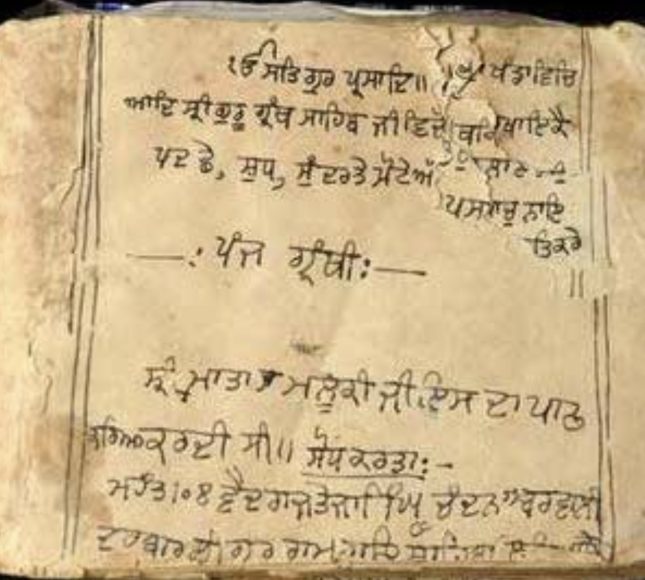PANJ GRANTHI, a pothi or small book containing five chosen texts, from the Guru Granth Sahib. The word panj means `five` and granthi is the diminutive form from granth (holy book). The Guru Granth Sahib is a large volume and can be enthroned and opened for recitation only in the prescribed ritualistic manner in gurudwaras or in a room especially set apart in a private house for this purpose. To facilitate private recitation or study of selected barns, small anthologies began to be prepared. The origin of the gutka (lit. a casket of gems; a breviary) is traced to the time of Guru Ram Das.
A gutka comprising the text of the Japu in Guru Ram Das` own hand is still preserved in a descendant family at Kartarpur, in Jalandhar district of the Punjab. A gutka as a rule contained one bani, mostly Japu, but later it took the form of the Panj Granthi incorporating five of the barns. The Panj Granthi, as it first appeared, included the Japu by Guru Nanak; So Dam and SoPurakhu, collectively known as Rahrasi and containing verses by Guru Nanak and by Guru Ram Das, Sohila verses by Guru Nanak, Guru Ram Das and Guru Arjan. Also, sometimes Asd ki Var by Guru Nanak, and Anandu by Guru Amar Das. As the number of professional copyists multiplied, gutkas and panj granthis began to have enlarged texts.
In course of time, Panj Granthi, as a title, became a misnomer, for the anthology no longer remained confined to the initial five banis.The name did survive, though more in the symbolic sense. A current Panj Granthi gathered by Bhai Vir Singh (1872-1957) comprises ten banis Japu, Japu, Shabad Hajare, Rahrasi, Sohila, Sidh Gosti, Anandu, Bavan Akhari, Sukhmani and Asa kiVar. Japu, Japu, Rahrasi, Sohila and Anandu are usually the five daily prayers of the Sikhs.
The devout also include in their daily regimen Shabad Hajare and Sukhmani in the morning. Asa kt Vars sung in the gurudwaras in the early hours of the morning. For its constituent texts, Panj Granthi continues exclusively to draw upon the Guru Granth Sahib, whereas the gutkas now include banis from the Guru Granth Sahib as well as from the Dasam Granth. T.s.
Historical Context and Origin
- Meaning and Composition:
The term Panj Granthi refers to a small booklet containing five selected hymns (banis) from the Guru Granth Sahib. The word panj means “five,” and granthi is a diminutive form of granth (holy book). Historically, these booklets were created to make sacred hymns more accessible for private recitation and study, especially for those who could not access the full Guru Granth Sahib. - Evolution:
Initially, the Panj Granthi included five core banis: Japji Sahib by Guru Nanak, Rehras Sahib, Sohila Sahib, Anand Sahib, and Asa di Var. Over time, additional hymns like Sukhmani Sahib, Shabad Hazare, and Dakhni Oankaar were incorporated, reflecting the evolving devotional practices of the Sikh community.
Symbolic Significance
- Accessibility to Devotion:
The Panj Granthi symbolizes the democratization of spiritual practice, allowing individuals to engage with sacred hymns in their daily lives. It represents the Sikh ethos of making divine wisdom accessible to all, irrespective of social or economic status. - Spiritual Discipline:
Reciting the Panj Granthi fosters a disciplined spiritual routine. The selected banis guide the devotee through different aspects of life—meditation, gratitude, reflection, and surrender to divine will. - Unity of Teachings:
The compilation reflects the unity of the Guru’s teachings, emphasizing the core principles of Sikhism: devotion to the Divine Name (Nam), ethical living, and service to humanity. - Symbol of Continuity:
The Panj Granthi serves as a bridge between the Guru Granth Sahib and the daily lives of devotees, ensuring that the teachings of the Gurus remain a constant presence.
Spiritual and Devotional Role
- Daily Prayers:
The hymns in the Panj Granthi are integral to Sikh daily prayers (Nitnem), guiding devotees through morning, evening, and bedtime meditations. - Portable Wisdom:
The compact nature of the Panj Granthi makes it a portable source of spiritual guidance, allowing devotees to carry and recite sacred hymns wherever they go. - Inspiration for Reflection:
The hymns inspire self-reflection and a deeper connection with the Divine, fostering inner peace and resilience in the face of life’s challenges.
Concluding Reflections
The Panj Granthi is more than a compilation of hymns; it is a spiritual companion that embodies the essence of Sikh teachings. By making sacred hymns accessible and fostering a disciplined devotional practice, it continues to inspire and guide devotees on their spiritual journey.



